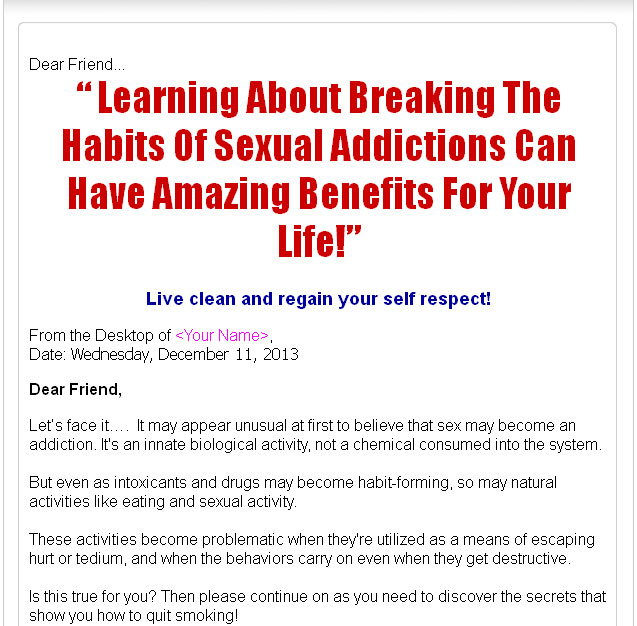Salespage Snapshot:

Table Of Contents
Foreword
Chapter 1:
When Is Sex Actually An Addiction
Chapter 2:
Myths
Chapter 3:
Getting On The Road To Recovery
Chapter 4:
Means To Recovery
Chapter 5:
Changes To Make
Sample Content Preview
Synopsis
Individuals who deal with sex addiction face a hurdle unlike recovery from drugs or alcohol. With chemical dependencies, recovery is difficult but at least soberness is aboveboard: recovery entails complete abstinence from the matter. Sex addiction is more perplexed. We’ll always be sexual individuals, and many addicts will engage in sexual practice throughout their lives. The question then gets to be: what makes up healthy – as contrary to addictive – sexual activity?
Beginning Steps
In that sense, the challenge is more like that confronted by food addicts. As the saying goes, “Trying to eat abstinently is like attempting to take a tiger out of a cage 3 times a day and then cajole him back in till the next time.” Recovering food addicts must eat. They can’t simply refrain from their “drug” – they have to acquire a healthy, in progress relationship with it. So must sex addicts.
The job may feel overpowering, but there’s hope. A lot of individuals around the globe are discovering recovery from addictive sexual conduct. How? How does recovery from sex addiction occur?
Recovery calls for facing topics about our past tense, here and now, and future tense. I promote what I call a “return to the future” approach: begin by becoming clear-cut about your vision for healthy sexuality (future tense), make certain that your surroundings help you move towards that vision (here and now), and do whatever it requires to make peace with your past tense.
I comprehend the importance of living in the here and now. Christ encouraged his following to not be apprehensive about tomorrow, but rather center on the needs of now. Paul wrote of his resolution to “forget what lies behind”. A lot of spiritual teachers stress the importance of living in the minute, and thought that’s highlighted by the “one day at one time” centering in much recovery teaching.
The “Return to the Future” plan of attack is merely a way to consider the problems of recovery. We get clean-cut about our vision for the future tense, not as we discount living in the here and now, but as we wish to move in the correct direction. We wish to make peace with our past tense not as we require to drag up old hurts and stay stuck in the past tense. We do it as we wish to free ourselves from the bonds of the past tense. We wish to let those old wounds go, so we may be free to live in the here and now, one day at a time.
With that in mind, think about this “Return to the Future” plan of attack to recovery from sexual battles.
Synopsis
Among the first jobs of recovery is to “institute sobriety.” With sex addiction, it’s even more elementary: we have to establish what sexual sobriety is. Till we get clean-cut about this, we’re stuck. A Chinese philosopher stated, “The journey of 1000 miles starts with one step.” But in this case we must first clear up the direction in which to assume that step.
A Path To Help
In its early on stages, recovery from sex addiction involves choosing what behaviors a individual wishes to include in her or her life, and what behaviors to refrain from. How do you choose this? 12 step recovery fellowships take issue about this. One group (Sex Addicts Anonymous, or SAA), promotes recovering addicts to choose for themselves – with counsel from their sponsor and support group – what their bottom lines has to be.
Individuals in SAA realize that this bottom line might alter over time, frequently moving from an across-the-board definition of sobriety to a more specific view over time.
For instance, early on recovery might call for distinguishing only the most debatable, risky behaviors (like unguarded sex, or sex outside of one’s devoted relationship). As time advances, the addict might come to think that additional activities (like porn use or compulsive masturbation) are addictive likewise.
A different fellowship (Sexaholics Anonymous or SA) delineates for its members a general definition of sobriety: “no sex in any variety with oneself, or anybody other than the spouse.” Their worry is that leaving the definition of sobriety vague opens the door to self-deceit.
They feel that addicts will battle to discover sexual health if they remain in compulsive behaviors, even if they haven’t listed those behaviors as part of their own personal “bottom lines.”
All the same we approach drawing a line between healthy and addictive behavior, the point here is that recovery can’t occur till we go through sobriety from the addictive behaviors. Till we go through some ongoing sobriety, we live in the mental and emotional cloud of addiction.
We cycle backward and forward from addictive hungering, acting out, self-reproach, and self-disgust for our conduct. When we start to break that cycle, we may begin the work of self-reflection that leads to inner shift.
Recovery vision is about what we bring, not just what we take off. Among the crucial problems in recovery from addiction is to understand what to fill one’s life with when faced by the void produced by ceasing the behavior.
As the saying goes, “It’s difficult to say no till you understand what yes is.” It’s difficult for an addict to abandon sexual conducts that have brought solace and exhilaration to life without having hope that other fit things may meet those needs.
A vision is an image of the future tense that pulls us forward. For sex addicts, among the many losses affiliated with their addiction is a loss of vision. A lot of addicts are so filled up with guilt that they’ve lost hope for a positive future. Their addiction has probably produced bedlam in their lives.
They might have lost occupations because of their addiction, or at any rate fought with weakened productivity. As addiction intensifies, it consumes more and more of an addicts’ time. Therefore, a lot of addicts lose touch with the hobbies and interests that brought a fit balance to life in the past. Life looks increasingly gloomy, and a positive future more and more remote.
Vision necessitates time. A vision for a fit future is crucial for recovery, but it takes time to acquire. In early on recovery, addicts’ lives are frequently still filled up with the bedlam produced by their addiction, and their brains are blurred by denial, rationalization, and hopelessness.
The future orientation of early on recovery must center on a sight of a life free from the mightiness of addictive sexual behavior. A lot of addicts have lived so long with their addiction, and fought with attempts to quit their behaviors for so long that they’ve lost hope.
They question if living sexually sober lives is even imaginable for them. Spending time with others who have experienced the battle and come through on the other side is helpful at this phase. Viewing other addicts who have accomplished long-run sobriety infuses the beginnings of a vision for an addict, as they begin to think, “If he/she may do this, perhaps I can also.”
It’s likewise crucial for addicts to spend time considering fit ways to experience replenishment. Frequently addicts have lost touch with fit ways of getting their needs met.
As time advances, and the addict discovers the emotional and spiritual clearness that comes from lengthy sobriety, his or her vision gets more clear-cut. Time that had been passed in illusion and acting out now may be vested in ways that tap into the addicts’ inborn talents and passions.
Our sex drive is, at its commonest level, an originative and passionate exhort. Recovery from sex addiction doesn’t call for suppressing this drive, but instead transferring its energy toward other interests which may become outlets for one’s creativeness and passion. In their addiction, a lot of addicts lost touch with the matters they were passionate about, and vested more and more of their passion and creativeness in acting out behaviors.
The procedure of recovery implies placing that same amount of energy, passion, and creativeness into fit pursuits.
Plainly the establishment of vision – of sobriety and of personal replenishment – is easier said than done, particularly for addicts who are living in surroundings filled with enticements to lapse into old sexual habits. Clearness and resolve aren’t adequate: we have to make changes to our surroundings.
Other Details- 1 Ebook (DOCX, PDF), 32 Pages
- Ecover (JPG)
- Salespage (HTML)
- Affirmations (DOC)
- Tip Sheet (DOC)
- File Size: 7,160 KB











